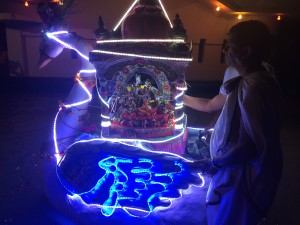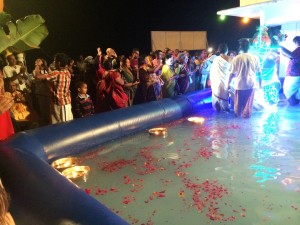12-Hour Kirtan Coming Soon! Mark Your Calendars!
4 QUESTIONS FOR YOUR SUCCESS
→ Gita Coaching
28 June 2014 – Gundica Marjana
→ ISKCON Desire Tree
29 June 2014 – Ratha Yatra Starts
→ ISKCON Desire Tree
Harinama in Parnumaa, Estonia (Album 36 photos)
→ Dandavats.com
 By chanting the holy name of the Supreme Lord, one comes to the stage of love of Godhead. Then the devotee is fixed in his vow as an eternal servant of the Lord, and he gradually becomes very much attached to a particular name and form of the Supreme Personality of Godhead. As his heart melts with ecstatic love, he laughs very loudly or cries or shouts. Sometimes he sings and dances like a madman, for he is indifferent to public opinion. SB 11.2.40 Read more ›
By chanting the holy name of the Supreme Lord, one comes to the stage of love of Godhead. Then the devotee is fixed in his vow as an eternal servant of the Lord, and he gradually becomes very much attached to a particular name and form of the Supreme Personality of Godhead. As his heart melts with ecstatic love, he laughs very loudly or cries or shouts. Sometimes he sings and dances like a madman, for he is indifferent to public opinion. SB 11.2.40 Read more › Gundica Clean-Up – Sunday, June 29, 2014
→ The Toronto Hare Krishna Temple!
As you may already know, on July 12th we will be holding our 42nd annual Festival of India (Ratha Yatra) and every year we clean the temple two weeks in advance. This is following the example set by Sri Caitanya Mahaprabhu, who held the first Gundica Clean Up some 500 years ago. This year we will be cleaning the temple on Snana Yatra, which is the day their Lordships Sri Jagannatha, Sri Baladeva and Sri Subhadra are bathed. After this bathing ceremony, all three fall ill and go into seclusion in order to get better. After two weeks, They will re-emerge for Ratha-Yatra. It is important that the temple is clean for when Lord Jagannatha makes His appearance after recuperating from being ill for two weeks.
So please join us for this amazing service. We promise it's going to be a fun day!
Here are the details:
Date: Sunday June 29th, 2014
Time: 10:00 AM sharp
What to wear: Clothes that you are willing to get a little dirty.
What to bring: Just yourself! We'll provide everything else you'll need.
Please RSVP if you can make it by emailing us at psenatoronto@gmail.com
Janmashtami 2014
→ New Vrindaban
janma karma ca me divyam
evaḿ yo vetti tattvataḥ
tyaktvā dehaḿ punar janma
naiti mām eti so 'rjuna
One who knows the transcendental nature of My appearance and activities does not, upon leaving the body, take his birth again in this material world, but attains My eternal abode, O Arjuna.
Janmastami is the Vaisnavas' most important and significant festival of the year. It is held in celebration of the birthday of the Supreme Personality of Godhead, Lord Krishna, Himself.
This year we invite you to come with your whole family and take advantage of this wonderful opportunity to get the blessings of Sri Sri Radha Vrindaban Chandra. You will have the chance to offer a very special Kalash Abhishek. Then witness the Lord, beautifully dressed in His most opulent, attractive attire, as He rides majestically in His famous Swan Boat on the New Vrindaban lake. Enjoy the elaborate Fireworks. Finally, savor a wonderful Prasadam Dinner Banquet.
Lord Krishnaâ's bathing ceremony called Abhishek is witnessed by all attendees while Kalash sponsors personally assist the temple pujaris by handing over the Pancha Dravya, the sacred bathing liquids.
Funds collected from Janmashtami are specifically used to render service to Lord Krishna, His devotees and the cows during winter months.
Dates for Janmashtami 2014:
August 16/17: Actual Janmashtami Midnight Celebration
August 23: Fire Yagna and Janmashtami Celebration
August 30 /31: Labor Day weekend, Janmashtami Celebration
August 31: Dahi Handi cum Garbha Dance Celebration

MAHA KALASH ABHISHEK $1501
• Complimentary accommodation for up to 4 family members,
(2 nights in the newly renovated Palace Lodge or 1 night in the cabin)
• Your entire family can participate in Kalash Abhishek of the Lord
• Special gold-plated Kalash and Harinam chaddar
• Foldable photo frame of Radha-Krishna
• Participation in Maha Yagna and Go-puja
• Special Janmashtami maha-prasadam package
• Complimentary Janmashtami Banquet prasadam for up
to four family members
KALASH ABHISHEK $751
• Complimentary accommodation for up to 4 family members,
(one night in the newly renovated, Palace Lodge)
• Your entire family can participate in Kalash Abhishek of the Lord
• Special gold-plated Kalash and Harinam chaddar
• Foldable photo frame of Radha-Krishna
• Participation in Maha Yagna and Go-puja
• Special Janmashtami Maha-Prasadam package
• Complimentary Janmashtami Banquet Prasadam for up
to four family members
SPONSORSHIPS JANMASHTAMI
Festival Annadanam - $11,111
Deity Dress - $8001
Festival Decorations - $5001
Janmastami Rajbhoga - $2501
Swan Boat - $1008
Fireworks - $501
Janmashtami Maha Yagna - $351
Go-Puja on Janmastami anmastami - $108
Reserve Now! Kalash Sponsorship is Limited.
Call 304-843-1600

Gaurnatraj Das Parampara Das Venkata Chalapati Das
Ext. 118 Ext. 103 Ext. 107
TO BOOK YOUR ACCOMMODATION
Participate in the biggest event of the Year. Call now and book your sponsorships.
We will celebrate Janmashtami on three different evenings. Please choose the one most convenient for you to participate in.

HG Maha Hari Prabhu / SB 10.64,22-25
→ Kalachandji's Audio Archive
Prabhupada Letters :: Anthology 2014-06-25 14:47:00 →
Prabhupada Letters :: 1970
Prabhupada Letters :: Anthology 2014-06-25 14:38:00 →
Prabhupada Letters :: 1971
Prabhupada Letters :: Anthology 2014-06-25 14:35:00 →
Prabhupada Letters :: 1972
Prabhupada Letters :: Anthology 2014-06-25 14:33:00 →
Prabhupada Letters :: 1973
Prabhupada Letters :: Anthology 2014-06-25 14:30:00 →
Prabhupada Letters :: 1974
Prabhupada Letters :: Anthology 2014-06-25 14:28:00 →
Prabhupada Letters :: 1974
Prabhupada Letters :: Anthology 2014-06-25 14:25:00 →
Prabhupada Letters :: 1974
Prabhupada Letters :: Anthology 2014-06-25 14:21:00 →
Prabhupada Letters :: 1974
The Walking Monk 2014-06-25 13:13:00
→ The Walking Monk
Monday, June 23rd, 2014
→ The Walking Monk
Make a Friend
The Kootenay Mountains are way behind us for now. I had been walking a new mountain range as of very recently – The Cascades. Every ecosystem of these mountain ranges seems to carry some uniqueness. The unique feature of where I tread today was the strong presence of different wild flowers. The rhododendrons really stand out. The ponderosa pine had for me become conspicuous by its absence. Everything here is very green. The Similkameen River had been my amigo for several days. Now it’s departed and it’s replaced by other streams.
It was fun to experience the companionship of crows. It almost seemed that around every other bend in the road, a pair of them (Heckle and Jeckle) would seem to be waiting, watching and squawking. They would buzz around a bit before taking flight off in some direction, perhaps for the next traveller. It was my last full day on the Crowsnest Pass. Perhaps these black feathered dudes were expressing parting words.
And of humans? Much interaction. An older man from France came cycling up a steep hill on destination to the Atlantic. A biker by the name of Pete bombed up and down the highway passing me by several times, until finally he just had to stop and ask, “What are you doing?” A couple, Ruth and Paul, were driving, then stopped to find out what my mission is all about. Corey, a female trucker, blew a tire going eastward on the Crowsnest Pass. She was stuck on the highway, and was also stuck talking to me about the virtues of walking and spirituality. It was mutual gain. Flat tires are often times opportunities for opening up new friendship.
Friendship is a major component of spiritual life. If we look at the life of Krishna, He had so many friends. So make a friend, go for a walk.
May the Source be with you!
40 KM
Rising Moon
→ ISKCON News

On the hundredth anniversary of the disappearance day of Srila Bhaktivinod Thakur, this brand new video about the TOVP project, which was so dear to Srila Bhaktivinod Thakur has been released. Many of prominent leaders in ISKCON have spoken very well to encourage participation from all members of ISKCON society. This video was produced by a young devotee, resident of Sridham Mayapur, as a seva for the new Sri Mayapur Chandradoya Mandir. A video by Jaganath Kirtan Das.
Paris Daily Harinama Sankirtana and Book Distribution 2014 (Album 413 photos)
→ Dandavats.com
 While suffering at the time of death, Ajamila chanted the holy name of the Lord, and although the chanting was directed toward his son, he nevertheless returned home, back to Godhead. Therefore if one faithfully and inoffensively chants the holy name of the Lord, where is the doubt that he will return to Godhead? SB 6.2.49 Read more ›
While suffering at the time of death, Ajamila chanted the holy name of the Lord, and although the chanting was directed toward his son, he nevertheless returned home, back to Godhead. Therefore if one faithfully and inoffensively chants the holy name of the Lord, where is the doubt that he will return to Godhead? SB 6.2.49 Read more › June 25th, 2014 – Darshan
→ Mayapur.com
The post June 25th, 2014 – Darshan appeared first on Mayapur.com.
Scenes from last Thursday’s evening program and yesterday’s downtown preaching at Govinda’s
→ SivaramaSwami.com
This is a delicate one
→ SivaramaSwami.com
Should gay bhakta X marry a gay bhaktin in order to satisfy his unknowing authorities and be able to be engaged as a pujari?
The post This is a delicate one appeared first on SivaramaSwami.com.
Going to the festival in Ukraine or not, pirating of books and a series of short questions and answers
→ SivaramaSwami.com
Russian/English Skype Conference.
The post Going to the festival in Ukraine or not, pirating of books and a series of short questions and answers appeared first on SivaramaSwami.com.
Jakarta Ratha-Yatra 2014 (Album 23 photos)
→ Dandavats.com
 Jakarta, the capital city of Indonesia celebrates its 487th anniversary on Sunday, 22 June 2014. Celebrating this occasion, the city hosts the Jakarnaval, a cultural parade from the National Monument to the Central Business District of Jakarta.
Hare Krishna devotees took this opportunity to celebrate their third annual Ratha-Yatra festival, displaying the vibrant faces of Jagannatha (Krishna), His brother Baladeva and His sister Subhadra Devi. Attendees took note of them, especially the governor, who received the Bhagavad-gita As It Is in Bahasa Indonesia. Read more ›
Jakarta, the capital city of Indonesia celebrates its 487th anniversary on Sunday, 22 June 2014. Celebrating this occasion, the city hosts the Jakarnaval, a cultural parade from the National Monument to the Central Business District of Jakarta.
Hare Krishna devotees took this opportunity to celebrate their third annual Ratha-Yatra festival, displaying the vibrant faces of Jagannatha (Krishna), His brother Baladeva and His sister Subhadra Devi. Attendees took note of them, especially the governor, who received the Bhagavad-gita As It Is in Bahasa Indonesia. Read more › Giriraja: Special darshan
→ KKSBlog
 Sri Giriraja, the Goverdhan Sila who is worshipped and carried around the world by Kadamba Kanana Swami, is currently having His eyes painted. Here is a special darshan for you! You may also view our gallery for more pictures.
Sri Giriraja, the Goverdhan Sila who is worshipped and carried around the world by Kadamba Kanana Swami, is currently having His eyes painted. Here is a special darshan for you! You may also view our gallery for more pictures.
Jagannatha Ashtakam 8 – The end of all desires except the desire to serve is the end of material existence
→ The Spiritual Scientist
Jagannatha Ashtakam 7 – A glimpse of the supreme indestructible rasa removes all taste for destructible things
→ The Spiritual Scientist
HG Syama Dasa – SB 10.69.17 – 20.06.2014
→ Gouranga TV - The Hare Krishna video collection
HG Syama Dasa – SB 10.69.17 – 20.06.2014
Jagannatha Ashtakam 6 – The rasanandi Lord relishes the highest ananda through the highest rasa reciprocated with his highest devotee
→ The Spiritual Scientist
Jagannatha Ashtakam 5 – The Ratha Yatra festival offers affectionate service in the association of those with intense devotion
→ The Spiritual Scientist
Mahabharata Characters 37 – Bhima 07 – Draupadi’s dishonorers destroyed
→ The Spiritual Scientist
This talk is a part of the "Fascinating Mahabharata Characters" series. To know more about this course, please visit: bhakticourses.com
Coming soon Tuesday Nights
→ Bhakti Lounge - The Heart Of Yoga in Wellington
Betrayal Resentment Forgiveness
Tuesday 15 July
Optional Yoga Class 5pm–545pm
Workshop 6pm–715pm
Dinner 715pm+
Tuesday 22 July
Optional Yoga Class 5pm–545pm
Workshop 6pm–715pm
Dinner 715pm+
Uprooting Anger
Tuesday 29 July
Optional Yoga Class 5pm-545pm
Workshop 6pm–715pm
Dinner 715pm+
or $30 for all 3 ($20 students)
Prices include optional Yoga Class, Workshop and Dinner.
Coming soon Tuesday nights
→ Bhakti Lounge - The Heart Of Yoga in Wellington
Betrayal Resentment Forgiveness
Tuesday 15 July
Optional Yoga Class 5pm–545pm
Workshop 6pm–715pm
Dinner 715pm+
Tuesday 22 July
Optional Yoga Class 5pm–545pm
Workshop 6pm–715pm
Dinner 715pm+
Uprooting Anger
Tuesday 29 July
Optional Yoga Class 5pm-545pm
Workshop 6pm–715pm
Dinner 715pm+
or $30 for all 3 ($20 students)
Prices include optional Yoga Class, Workshop and Dinner.
HG Narottamananda Prabhu / Kalachandji’s Bhagavad-Gītā Meditation Course – 25
→ Kalachandji's Audio Archive
HH Bhakti Sundar Goswami / SB 10.64.16
→ Kalachandji's Audio Archive
Rtadhvaja Swami / The Darshan Room\ Bg 13.34
→ Kalachandji's Audio Archive
Radha Damodara Sigatoka
→ Ramai Swami
During the festival of Fiji devotees traveled to the Sigatoka temple of Sri Sri Radha Damodara. This 3 storey temple sits majestically on top of a hill that overlooks the town.
Our Cancún Trip–Part 2 Beach, Harinam and Book Distribution
→ Nityananda Chandra Das' Blog, ISKCON Dallas


This guy was the smaller one. Both were waiting near the bus stop.







In front of Plaza la Isla shopping center we got to meet this friendly spider monkey. He was very friendly and climbed on our heads and our hands. When some more kids showed up and started petting him he got a little nervous and bit Visakha finger. He also doesn’t like cameras so he doesn’t look happy picture as well. Here you can see him give an upset squeak to the camera.


It tickled. As a Father’s Day present Krishna Mangala had me sit in one of these.

We distributed a book to the guy running it.


After our little exploration we went to Gopal’s Vegetarian restaurant for some prasadam, harinam kirtan, and spiritual book distribution.



The airport was like a shopping mall trying to confiscate the last of your money.



The plane ride was wonderful. I was originally supposed to sit next to this nice older couple but my seat was changed to sit next to these two young sisters from Austin. One was 13 and the other was 15. The older one started to ask me about my attire. She then began to explain to me that she is doing a study on the nature of happiness. From that point on we had a wonderful discussion about happiness, the soul, reincarnation, devotional service and the three modes of nature. She told me that she is generally quite afraid of flying but did not think about during this flight because of the interesting discussion. She was very happy to receive a copy of the Bhagavad Gita in Spanish. It is always nice to bring some BBT books with you where ever you go. This what she wrote me on Facebook
Thank you. It was a pleasure to meet you as well. I enjoyed learning about the ancient Indian culture and I have different views of the world now. Thank you so much!to see the pics that you missed click here.
TEXAS FAITH 131: In love and marriage, do different faiths really matter in America?
→ Nityananda Chandra Das' Blog, ISKCON Dallas
 Dallas Morning News,
Dallas Morning News,
Each week we will post a question to a panel of about two dozen clergy, laity and theologians, all of whom are based in Texas or are from Texas. They will chime in with their responses to the question of the week. And you, readers, will be able to respond to their answers through the comment box.
Recently, I attended the beautiful wedding of two friends, one from a Jewish family and one from a Christian family. The ceremony largely followed the Jewish tradition with occasional mention of the bride’s Christian upbringing.
I began to wonder, witnessing this blending of two people into one couple bound under God, what place separate faiths really serve in our society. If we are honest, there is no justifying the fundamental difference in belief between Christians and Jews or the other major faiths. But in cases like these, it is our cultural homogeneity that is more important than the tenets of our faith.
Given that, what does faith really mean in circumstances like these? Is faith or religion simply ceremonial? Or are we overcoming divisions in the name of something greater – that is – love?
Read our panelists’ responses below.
NITYANANDA CHANDRA DAS, minister of ISKCON (International Society for Krishna Consciousness), Dallas

Marriage is not just about an attraction of two parties but also those two parties working together to help each other to attain true happiness. True happiness is found by connecting beyond the temporary to the Supreme Being. Because marriage relates to that progressive spiritual advancement in the service of God, considerations of compatibility should not be ignored. The spiritual ideology, or how we see ourselves at our core, and how we individually apply such spiritual ideology must be taken into consideration. Incompatibilities certainly exist within those of the same tradition. Therefore it is important in all cases to see that both parties can properly help each other's growth towards true spiritual happiness.To see all responses of the TEXAS Faith panel click here.












